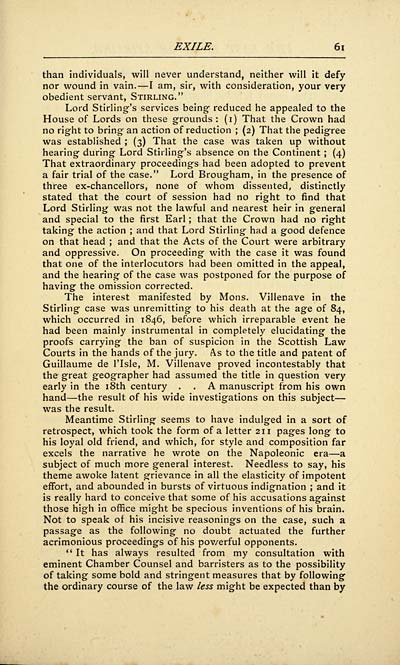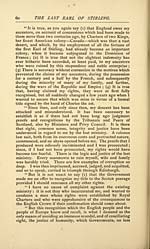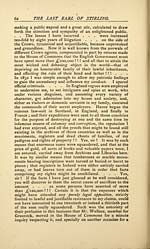Life of the last Earl of Stirling
(71) Page 61
Download files
Complete book:
Individual page:
Thumbnail gallery: Grid view | List view

EXILE. 6 1
than individuals, will never understand, neither will it defy
nor wound in vain. — I am, sir, with consideration, your very
obedient servant, Stirling."
Lord Stirling's services being reduced he appealed to the
House of Lords on these grounds: (i) That the Crown had
no right to bring an action of reduction ; (2) That the pedigree
was established ; (3) That the case was taken up without
hearing during Lord Stirling's absence on the Continent ; (4)
That extraordinary proceedings had been adopted to prevent
a fair trial of the case." Lord Brougham, in the presence of
three ex-chancellors, none of whom dissented, distinctly
stated that the court of session had no right to find that
Lord Stirling was not the lawful and nearest heir in general
and special to the first Earl ; that the Crown had no right
taking the action ; and that Lord Stirling had a good defence
on that head ; and that the Acts of the Court were arbitrary
and oppressive. On proceeding with the case it was found
that one of the interlocutors had been omitted in the appeal,
and the hearing of the case was postponed for the purpose of
having the omission corrected.
The interest manifested by Mons. Villenave in the
Stirling case was unremitting to his death at the age of 84,
which occurred in 1846, before which irreparable event he
had been mainly instrumental in completely elucidating the
proofs carrying the ban of suspicion in the Scottish Law
Courts in the hands of the jury. As to the title and patent of
Guillaume de l'lsle, M. Villenave proved incontestably that
the great geographer had assumed the title in question very
early in the 18th century . . A manuscript from his own
hand — the result of his wide investigations on this subject —
was the result.
Meantime Stirling seems to have indulged in a sort of
retrospect, which took the form of a letter 211 pages long to
his loyal old friend, and which, for style and composition far
excels the narrative he wrote on the Napoleonic era — a
subject of much more general interest. Needless to say, his
theme awoke latent grievance in all the elasticity of impotent
effort, and abounded in bursts of virtuous indignation ; and it
is really hard to conceive that some of his accusations against
those high in office might be specious inventions of his brain.
Not to speak of his incisive reasonings on the case, such a
passage as the following no doubt actuated the further
acrimonious proceedings of his pov/erful opponents.
" It has always resulted from my consultation with
eminent Chamber Counsel and barristers as to the possibility
of taking some bold and stringent measures that by following
the ordinary course of the law less might be expected than by
than individuals, will never understand, neither will it defy
nor wound in vain. — I am, sir, with consideration, your very
obedient servant, Stirling."
Lord Stirling's services being reduced he appealed to the
House of Lords on these grounds: (i) That the Crown had
no right to bring an action of reduction ; (2) That the pedigree
was established ; (3) That the case was taken up without
hearing during Lord Stirling's absence on the Continent ; (4)
That extraordinary proceedings had been adopted to prevent
a fair trial of the case." Lord Brougham, in the presence of
three ex-chancellors, none of whom dissented, distinctly
stated that the court of session had no right to find that
Lord Stirling was not the lawful and nearest heir in general
and special to the first Earl ; that the Crown had no right
taking the action ; and that Lord Stirling had a good defence
on that head ; and that the Acts of the Court were arbitrary
and oppressive. On proceeding with the case it was found
that one of the interlocutors had been omitted in the appeal,
and the hearing of the case was postponed for the purpose of
having the omission corrected.
The interest manifested by Mons. Villenave in the
Stirling case was unremitting to his death at the age of 84,
which occurred in 1846, before which irreparable event he
had been mainly instrumental in completely elucidating the
proofs carrying the ban of suspicion in the Scottish Law
Courts in the hands of the jury. As to the title and patent of
Guillaume de l'lsle, M. Villenave proved incontestably that
the great geographer had assumed the title in question very
early in the 18th century . . A manuscript from his own
hand — the result of his wide investigations on this subject —
was the result.
Meantime Stirling seems to have indulged in a sort of
retrospect, which took the form of a letter 211 pages long to
his loyal old friend, and which, for style and composition far
excels the narrative he wrote on the Napoleonic era — a
subject of much more general interest. Needless to say, his
theme awoke latent grievance in all the elasticity of impotent
effort, and abounded in bursts of virtuous indignation ; and it
is really hard to conceive that some of his accusations against
those high in office might be specious inventions of his brain.
Not to speak of his incisive reasonings on the case, such a
passage as the following no doubt actuated the further
acrimonious proceedings of his pov/erful opponents.
" It has always resulted from my consultation with
eminent Chamber Counsel and barristers as to the possibility
of taking some bold and stringent measures that by following
the ordinary course of the law less might be expected than by
Set display mode to:
![]() Universal Viewer |
Universal Viewer | ![]() Mirador |
Large image | Transcription
Mirador |
Large image | Transcription
Images and transcriptions on this page, including medium image downloads, may be used under the Creative Commons Attribution 4.0 International Licence unless otherwise stated. ![]()
| Histories of Scottish families > Life of the last Earl of Stirling > (71) Page 61 |
|---|
| Permanent URL | https://digital.nls.uk/95601293 |
|---|
| Description | A selection of almost 400 printed items relating to the history of Scottish families, mostly dating from the 19th and early 20th centuries. Includes memoirs, genealogies and clan histories, with a few produced by emigrant families. The earliest family history goes back to AD 916. |
|---|

